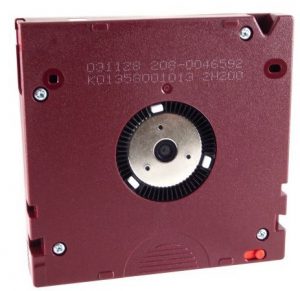History (2000): Linear Tape-Open (LTO)
More open standard to kill DLT
This is a Press Release edited by StorageNewsletter.com on September 4, 2018 at 2:11 pmThis article was published by the Museum of Obsolete Media.
Linear Tape-Open (LTO) (2000 – )

Linear Tape-Open (or LTO) is a magnetic tape data storage technology released in 2000, mainly used for backup.
It was designed as a more open standard to compete with the DLT tape format.
Two versions of LTO were planned, but only the Ultrium version was released, using half-inch tape in a single-reel cartridge.
The first generation could contain up to 100GB on a cartridge. Generation (version 6) released in 2012 can hold 2.5TB.
The tape inside an LTO cartridge is wound around a single reel. The end of the tape is attached to a perpendicular leader pin that is used by the drive to grasp the end of the tape and mount it in a take-up reel. When a cartridge is not in a drive, the pin is held in place at the opening of the cartridge with a small spring.
Most manufacturers produced different generations of LTO cartridges in different colours, generally being 1) black or gray, 2) purple, 3) blue-grey, 4) Green, 5) Dark red, 6) Black.
Every LTO cartridge has a memory chip inside it, with a total of 8KB on newer generations. This is used to identify tapes, identify generations of tape, or store tape-use information.














 Subscribe to our free daily newsletter
Subscribe to our free daily newsletter


